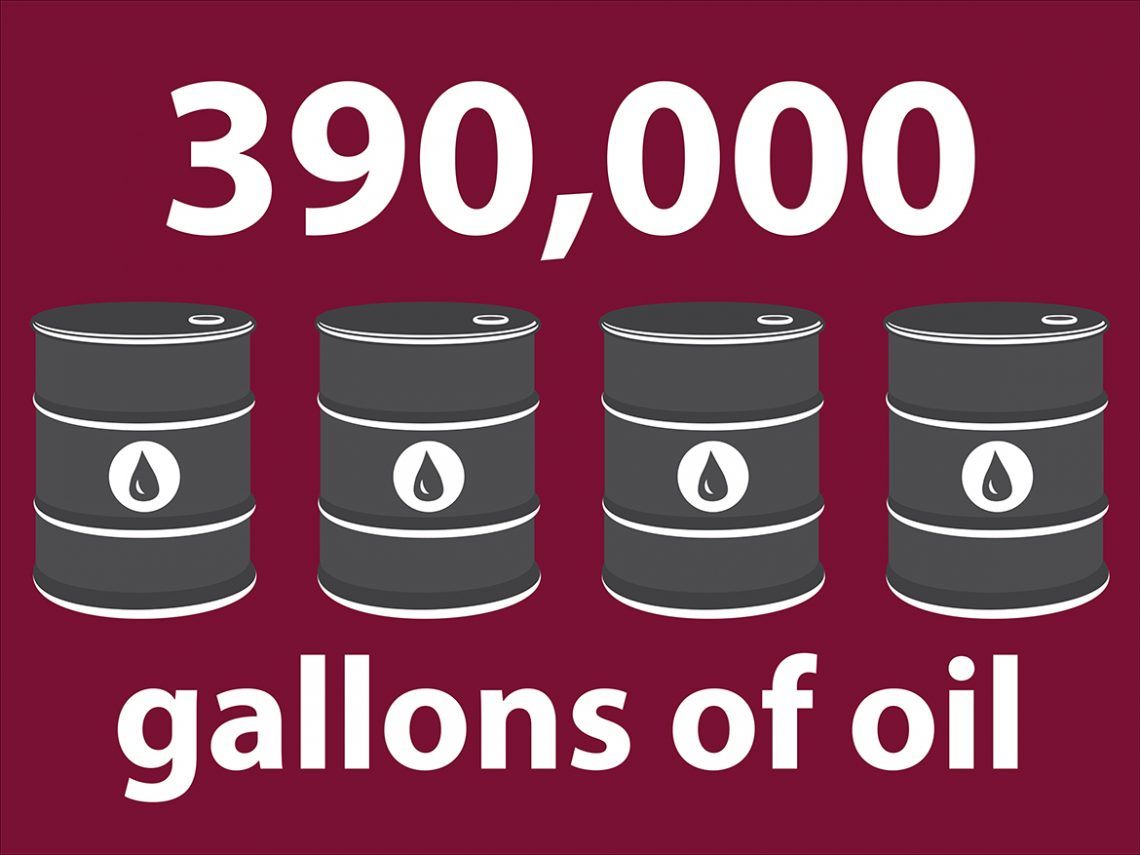Whether it’s been a year since you were last on campus or time better measured in decades, chances are good there’s been some change since you last visited Farmington.
In this regular feature, we’ll re-introduce you to UMF, highlighting what’s distinctive about the University — and what’s worth telling the college-bound people in your life.
Infographics: Ryan Mastrangelo / Words: Marc Glass

390,000 gallons. That’s how much oil UMF isn’t burning per year since UMF’s Biomass Central Heating Plant came online in 2016. Whether you look at it in terms of cost reduction or carbon reduction, it’s a good thing. The biggest heat-only biomass plant in the state has cut the University’s annual heating costs by more than 70 percent (from $1.2 million to approximately $350,000 a season) and reduced its carbon emissions by 32 percent (down 4,000 tons per year). As UMF sources the 4,000 tons of wood chips it burns annually from within a 60-mile radius of campus, the University provides vital financial support to the local forest economy. And the University’s wood-chip supplier, Cousineau Wood Products of Anson, follows sustainable harvesting practices, such as selective cutting and the planting of saplings to replenish forests. Once construction in the depths of Dearborn Gymnasium is completed, the cost and carbon savings will likely grow. By late-October, Dearborn and Alumni Theater will be connected to the underground circuit that delivers biomass-heated water to 27 campus buildings, including UMF’s Fitness and Recreation Center, as well as Dakin, Frances Allen Black, Lockwood, Preble, Scott, and Ricker halls.

A recent Portland Press Herald story confirms what many Maine outdoor enthusiasts have long suspected: The outdoor recreation industry — to the tune of $2.9 billion — comprises a larger share of Maine’s economy than it does for all but two other states in the nation (Hawaii and Montana). For those on campus and in the greater Farmington area who lack the resources to fund and access outdoor recreation, UMF offers its Mainely Outdoors program, which, since 2008, has provided students and community members with transportation to a broad range of trips and excursions, as well as outdoor gear for sign-out or low-cost rent. To date, the Mainely Outdoors gear stash of 177 pieces of equipment includes 34 pairs of snowshoes, 15 pairs of Nordic skis, 15 kayaks, 14 canoes, 10 stand-up paddle boards, 30 life jackets, 12 mountain bikes, 10 sleeping bags, 10 sleeping pads, 10 backpacks, six tents, three camp stoves, three backpacking stoves, four ski/snowboard tuning stations, one bike-tuning station, and numerous pairs of Nordic boots and bike helmets. All the grant-funded or gift-in-kind gear is worth well into six figures. The value of the memories students and community members make with it? Priceless.

It really shouldn’t come as a surprise to alumni, but perhaps it will: UMF has a competitive alpine team. A very competitive team. Led by Head Coach Andrew Willihan ’06, the 2019 men’s and women’s alpine squads took first place in the United States Collegiate Ski and Snowboard Association’s Reynolds Division, comprising Division II and III varsity teams and clubs in Maine. In 2019, 16 skiers achieved podium finishes, nine were named All-Division student-athletes, and the teams claimed the Reynolds Division Ricker Cup Championship. In 2018, the program successes included 18 individual podium finishes, seven All-Division athletes, the men winning the Reynolds Division championship, and the women tying for second. And the trendline for the future looks good. Through successful recruiting, Willihan ’06, who was named Eastern Region Coach of the Year in 2018, nearly doubled the size of the team in recent years — from 11 student-athletes to 21.

